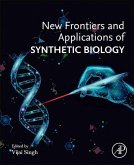This first edition of this book was the first manual for laboratory work in the rapidly expanding field of synthetic biology. Aimed at non-specialists, it contained protocols central to synthetic biology in both research and education. It also included information for students of the annual international Genetically Engineered Machine (iGEM) competition and the emerging biohacker community. In addition, it detailed a colorful lab course in bacterial synthetic biology based on chromoproteins. The second edition covers new material including our next-generation less-toxic versions of the chromoproteins (now made available as kits), UV-free imaging and quantitation with smartphones, a computational modeling lab and yeast experiment, logic gates, type IIS cloning and the CRISPR revolution.Our decade-old manual is still the only lab course book in synthetic biology that is based on chromoproteins, the simplest bacterial reporters. However, this has become outdated due to our development of next-generation, less-toxic chromoproteins and UV-free quantitation. The main competing lab course book in synthetic biology is still the decade-old BioBuilder: Synthetic Biology in The Lab by Kuldell et al. (2015). However, it is based on outdated approaches that use more complicated methods than chromoproteins to enable colored reporters, making it a less-suitable educational tool. In addition, topical issues in synthetic biology such as computational modeling, logic gates, type IIS cloning and eukaryotic experiments, including the CRISPR revolution are now covered.
Hinweis: Dieser Artikel kann nur an eine deutsche Lieferadresse ausgeliefert werden.
Hinweis: Dieser Artikel kann nur an eine deutsche Lieferadresse ausgeliefert werden.








